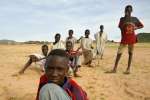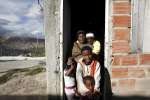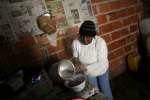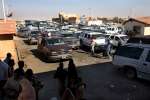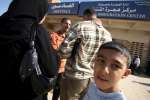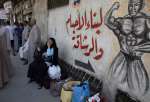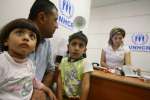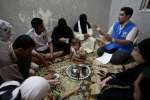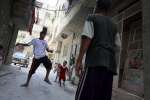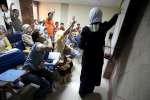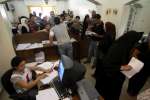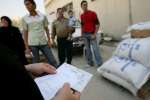Students benefit from UNHCR internship in Cyprus
News Stories, 14 January 2008
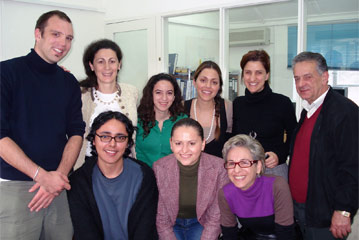
NICOSIA, Cyprus, January 14 (UNHCR) – Working for the UN refugee agency in Cyprus has been an eye-opening and rewarding experience for more than a dozen graduate and post-graduate students over the past 18 months.
The small, hard-pressed UNHCR office in Nicosia, which launched an internship programme some two years ago, has been immensely grateful for their help. And the interns believe it will help them in their professional careers.
UNHCR Cyprus took on its first interns in March 2006 from advanced students, undergraduates and recent graduates around the world in areas such as political sciences, social development, international relations, public policy, law, sociology and anthropology. A keen interest in humanitarian affairs was a must, while Greek-language skills were an asset.
Several people applied to join the Nicosia office, which has a staff of just five people to help meet the growing protection needs of some 900 refugees and more than 10,000 asylum seekers living in Cyprus, one of the smallest states in the European Union.
To date, 13 graduates or post-graduates have been taken on as interns, each working for stints of at least three months. Most are from outside Cyprus and all said they found the experience rewarding and thought it would help them on the career ladder. UNHCR appraises each intern and issues recommendation letters based on performance.
"It's invaluable experience if you want a career with an international organization," said 29-year-old Georg, who has a degree in international relations, law and economics from Germany's Tubinger University. "Familiarity with the UN system and with working in a multicultural and multinational environment is a prerequisite that UN personnel recruiters are looking for."
An internship not only opens doors, it can also help influence career choices. "It has sparked my interest in the legal aspects of refugee protection and I intend to pursue this avenue as a career path," said Eleni, 26, a US-Greek undergraduate at Tufts University in the United States. "A few months at UNHCR are sure to help hone your interests as well as your skills."
Many people dismiss internship programmes as a way to get labour for nothing. But the UNHCR interns in Cyprus, who work for free, said they were treated with respect and assigned specific tasks. Georg spent his three-and-a-half month internship visiting detention centres to gather information about detained asylum seekers. He reported back every day to his supervisor.
Each intern is closely supervised by a permanent member of staff and most work in the fields of legal protection or public information and fund-raising. The internships consist mainly of on-the-job training. Once the interns are ready, they are assigned to a specific task and expected to work independently.
For instance, while Georg visited detention centres, Eleni's primary responsibility was to take detailed notes during interviews of Iraqi asylum seekers by government officials. She was also involved in work ranging from legal research to gathering data for use in advocacy work for the rights of individual refugees and asylum seekers.
Cypriot-Iranian Dana, a postgraduate at Columbia University after completing a degree in social anthropology at London's School of Oriental and African Studies, did her internship in public information. She says this experience "allowed me to try to affect misconceptions and raise awareness for an often-forgotten cause."
She said her experience had been very rewarding, "not only because I learnt first hand about the asylum system in Cyprus and the challenges it faces, but also because it encouraged me to want to make a difference to the local community."
The office in Cyprus, where UNHCR has been playing an increasingly important role, is just as positive about the arrangement.
"Interns substantially complement our meagre resources in the intense and complex environment in which we work for the protection of refugees and asylum seekers," said UNHCR Representative Cristina Planas. "At the same time interns are the ambassadors of the refugee cause; through the multiplier effect that interns have, UNHCR is spreading its messages and expanding partnerships."
The workload of the UNHCR office in Nicosia has increased in line with the growing nexus between asylum and migration. This has meant increased legal, protection and public awareness challenges for the staff. In 2002, only 951 people applied for asylum in Cyprus – the figure for the first 10 months of 2007 was 5,379.
UNHCR headquarters and family duty stations around the world take on interns for stints of between two months and half-a-year, but the agency does not have a systematic internship programme. People are taken on according to need throughout the year.
Interns do not get paid and are not covered by UN insurance or health schemes. But an internship with UNHCR can open doors. "It's like a first job experience that they can put on their CV," said an official in Geneva.
By Emilia Strovolidou in Nicosia, Cyprus

















